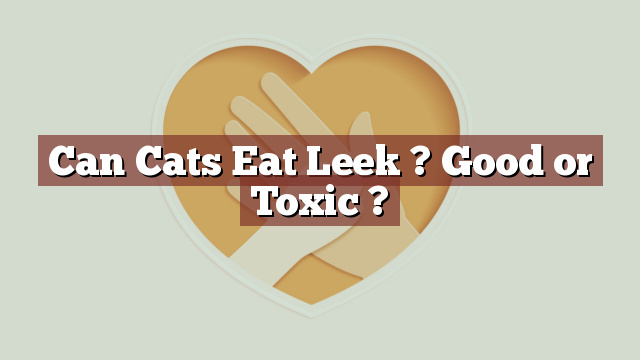Can Cats Eat Leek? Good or Toxic?
As pet owners, we all want to ensure that our beloved cats are consuming safe and healthy foods. It is crucial to be aware of the potential risks and benefits of different foods in order to make informed decisions about our pets’ diets. In this article, we will explore whether or not cats can safely consume leek, a popular vegetable known for its unique flavor and numerous health benefits.
Nutritional Value of Leek: Vitamins, Minerals, and More
Leek is a vegetable closely related to onions and garlic, known for its mild onion-like taste. It is rich in various essential nutrients such as vitamins A, C, and K, as well as minerals like calcium, potassium, and manganese. Additionally, leek contains antioxidants, which may help reduce the risk of certain diseases.
Can Cats Eat Leek? Exploring Safety and Toxicity
Cats should not eat leek. It is important to note that leek belongs to the Allium family, which also includes onions, garlic, and chives. These vegetables contain compounds that can be toxic to cats, specifically N-propyl disulfide. Even in small quantities, these compounds can cause damage to a cat’s red blood cells, leading to a condition called hemolytic anemia.
Scientific studies and veterinary experts strongly advise against feeding leek to cats due to the potential risks associated with their consumption. It is always better to err on the side of caution when it comes to our pets’ health.
Potential Risks or Benefits of Cats Consuming Leek
While leek provides various health benefits for humans, such as boosting the immune system and promoting heart health, these benefits do not extend to cats. The risks associated with leek consumption in cats outweigh any potential benefits.
Ingesting leek can lead to a range of symptoms such as vomiting, diarrhea, abdominal pain, weakness, and even more serious conditions like anemia. It is crucial to prevent cats from consuming any form of leek, whether it is raw, cooked, or in powdered form.
My Cat Ate Leek, Now What? Steps to Take Immediately
If you suspect or know that your cat has consumed leek, it is important to take immediate action. Contact your veterinarian or an animal poison control hotline to seek professional advice tailored to your cat’s specific situation. They will guide you on the necessary steps to ensure your cat’s well-being.
In some cases, induced vomiting or charcoal administration may be recommended to prevent the absorption of toxins. Prompt medical attention is crucial, as the effects of leek toxicity can be potentially life-threatening.
Conclusion: Understanding Leek’s Place in a Cat’s Diet
In conclusion, it is clear that cats should not eat leek. While leek offers various health benefits for humans, it can be harmful and toxic to cats due to the presence of compounds that can damage their red blood cells.
As responsible pet owners, it is essential to prioritize the safety of our furry friends by being aware of the potential dangers associated with certain foods. If you have any doubts or concerns about your cat’s diet, always consult with a veterinarian to ensure their well-being and longevity.
Thank you for investing your time in exploring [page_title] on Can-Eat.org. Our goal is to provide readers like you with thorough and reliable information about various dietary topics. Each article, including [page_title], stems from diligent research and a passion for understanding the nuances of our food choices. We believe that knowledge is a vital step towards making informed and healthy decisions. However, while "[page_title]" sheds light on its specific topic, it's crucial to remember that everyone's body reacts differently to foods and dietary changes. What might be beneficial for one person could have different effects on another. Before you consider integrating suggestions or insights from "[page_title]" into your diet, it's always wise to consult with a nutritionist or healthcare professional. Their specialized knowledge ensures that you're making choices best suited to your individual health needs. As you navigate [page_title], be mindful of potential allergies, intolerances, or unique dietary requirements you may have. No singular article can capture the vast diversity of human health, and individualized guidance is invaluable. The content provided in [page_title] serves as a general guide. It is not, by any means, a substitute for personalized medical or nutritional advice. Your health should always be the top priority, and professional guidance is the best path forward. In your journey towards a balanced and nutritious lifestyle, we hope that [page_title] serves as a helpful stepping stone. Remember, informed decisions lead to healthier outcomes. Thank you for trusting Can-Eat.org. Continue exploring, learning, and prioritizing your health. Cheers to a well-informed and healthier future!

